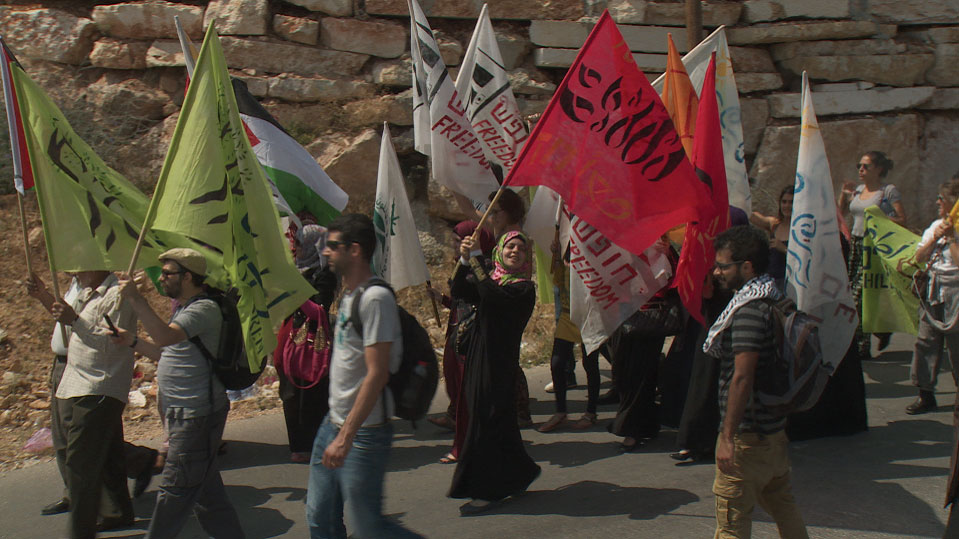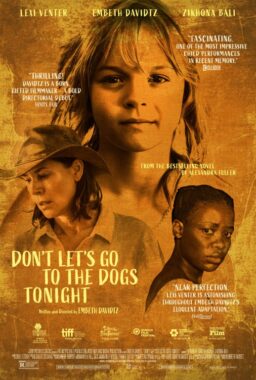Friday’s first screening marked a historic event in the 18 years of Ebertfest: the first presentation of the Ebert Humanitarian Award, a recognition for films that exemplify humanity and empathy. Directors Stephen Apkon & Andrew Young received it for “Disturbing the Peace,” which made its Special Premiere at Ebertfest. It’s about the horror of the Israeli-Palestinian conflict we have all heard about, but may have never seen expressed beyond our homeland media, nor shown with images of people finding love for the other side in spite of their trauma. With its soaring examples of the type of peace that could heal so many, it sets a high precedent for the fest’s new humanitarian award.
The focus of the film is on the members of Combatants for Peace, a group of Israelis and Palestinians who actively advocate against violence because of the horror the Israeli-Palestinian conflict has brought to their lives. Apkon and Young show us different narratives of both Israeli and Palestinian people, using an impressive amount of footage (spanning decades) and reenactment to make their trauma immediate. In gripping interviews, the subjects tell us directly the source of their pain; the family members and friends they lost for no reason at all. The movie doesn’t hold back from these realities–showing such gruesome violent clashes and dead bodies, giving viewers a tangible sense of the anger and fear. We see the inner logic to how a person’s retaliation felt justified to them, whether releasing the hatred in the form of throwing rocks or Molotov cocktails, or planning to become suicide bombers.
“Disturbing the Peace” then shares the individual eureka moments: how and why one side recognized the humanity of the other side. To hear these examples of life-saving love, one-by-one from Israelis and Palestinians, is a profoundly touching point in the documentary. Not only does it provide proof of previously thought unbelievable tales of peace, but it further humanizes everyone in the conflict. It also gives hope to the possibility of reconciliation, as encouraged by Archbishop Desmond Tutu.
When these interview subjects later gather as a coalition to organize peaceful protests as Combatants for Peace, Apkon & Young’s film approaches its feel-good third act with the best clarity. It doesn’t ignore the ongoing debate about choosing peace over war, showing the reactions the Combatants have received from those who don’t agree with them, those who call them traitors for loving those on the other side.
The film’s work is only getting started after being shown at Ebertfest: its true journey will start when it is shown to different people around the world, who will see an idea of realistic but possible peace from one of the most violent regions in the world.
After a two-minute standing ovation, a Q&A was held with the filmmakers and subjects. Chaz presented all of the guests with a Golden Thumb inscribed: “Ebert Humanitarian Award,” to distinguish it from the thumbs given to other filmmakers. But what made this occasion even more special was the giving of Roger Ebert’s handkerchiefs to take back to Israel and Palestine as a tribute to his statement that movies about goodness made him cry more than films that were simply sad. The handkerchief also symbolized the empathy that was exhibited by the Combatants for Peace for walking in each other’s shoes to experience what it was truly like for the other side. Chaz then invited twenty various members of the audience to the stage to stand in unity with the subjects and filmmakers. She said “The people stand with you for peace, and to change this story. It takes a village.”
Expressing that he needed a breath after the crowd’s reaction, Israeli subject Chen Alon said himself, “The film said it all.” He emphasized that the cause was about two journeys, that of “humanization, or re-humanization” and the ongoing strategizing of the non-violent struggle. He added that they currently have joint memorial services for Israeli-Palestinians, and asked for people to support their page (the site grew 50 likes during the span of the Q&A).
Speaking about the construction of the film, Apkon provided an image of how Ebertfest helped get this movie on track. As there kept being more material for them to shoot, Apkon confided that “The reason that we actually wanted to finish the film was because of Chaz,” sharing how they wanted to show it to her. They were in Israel when Chaz saw someone killed in an incident on television and wrote to check that they were safe. They told her they were safe and would finish the film in Israel and wanted to show it to her. She pressed them for a date and they set an arbitrary date of March 10. Apkon said from that moment on they did everything to make the March 10 date, and showed it to Chaz at the Jacob Burns Film Center in Pleasantville, New York on March 10. “I’m speechless,” Chaz said. “I thought it was just a hard date that was already set.”
The Q&A session explored how the filmmakers were brought into this story, coming from outsider perspectives who quickly saw different images. Apkon said he noticed that people of Israel and Palestine were stuck in a narrative, a cycle of perpetrator and victim. His co-director Young expressed that he had a “CNN idea of the region, of the conflict.” But it was the experience of witnessing Combatants for Peace in action, in theatrical group experiences and group conversations, that really stuck with him. “It was a story that I had never been exposed to before.”
One of the film’s many emotional scenes involves a mother talking to her daughter about the time the mother said she was going to be a suicide bomber. It raised a question addressed by story consultant Marcina Hale, who related the film to the day’s previous panel discussion of women in film today: “We are the mothers of the men who are at war. We have more power than we think. What role are we playing in that conflict?” She later added, “War, just like love, is not inevitable. We have to choose it.”
Palestinian subject Sulaiman Khatib, the director of Combatants for Peace, spoke about his personal transformation while in prison, learning about the likes of Ghandi and Nelson Mandela. “A few crazy people are needed to make the change … to be afraid doesn’t make us stop.”












